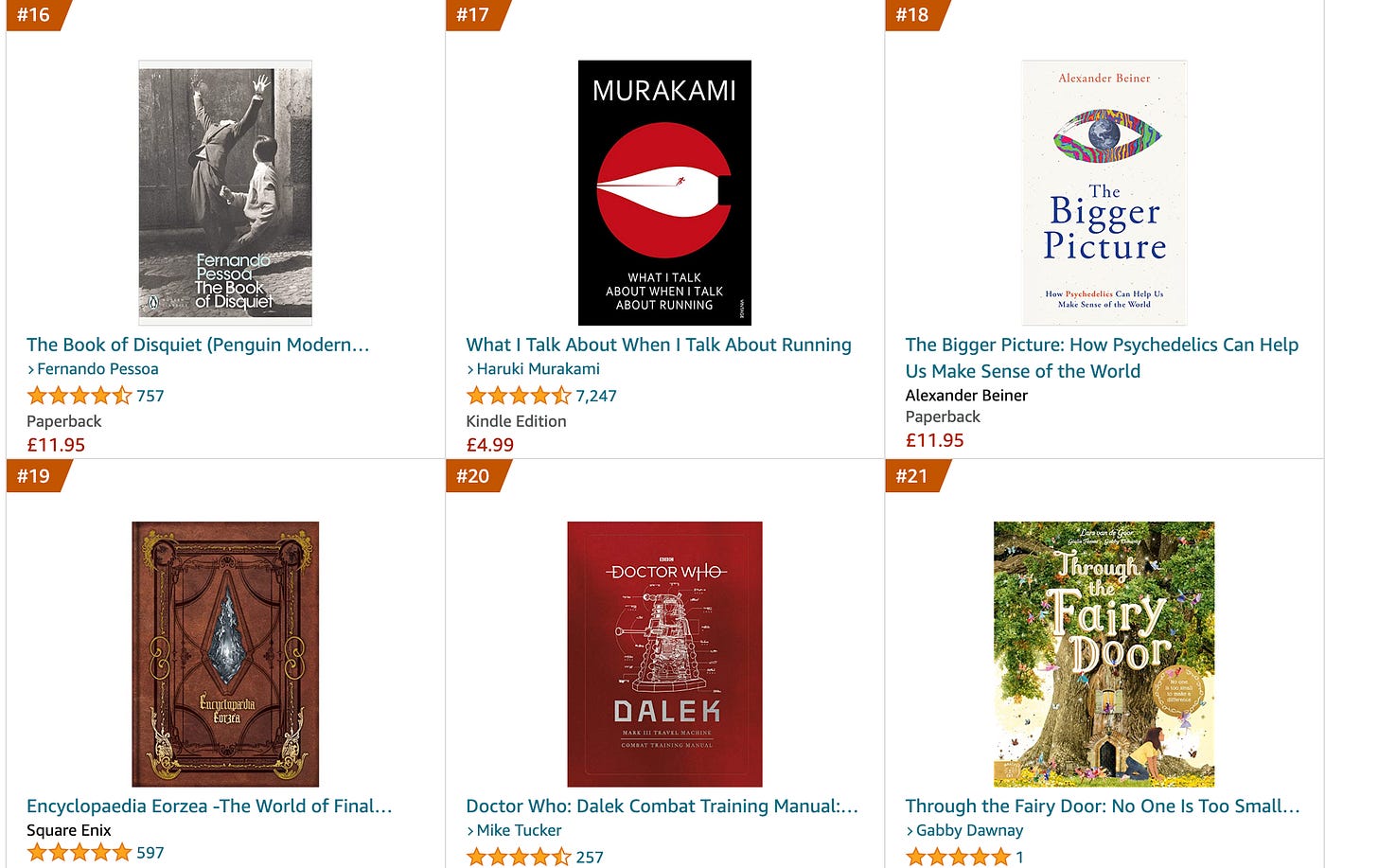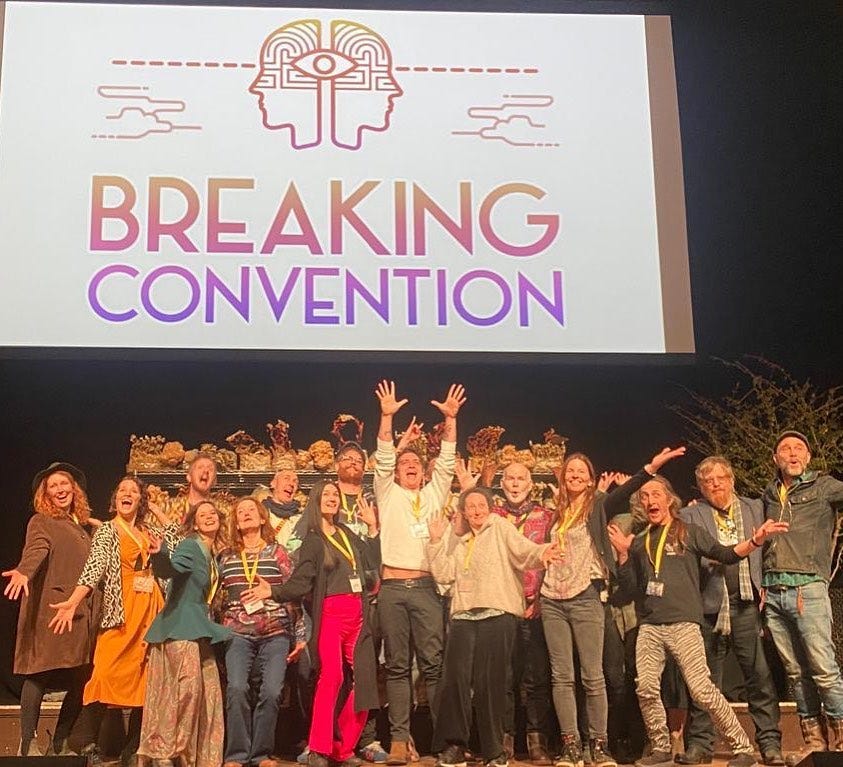Succession, Narcissists and Vampires
A sneak-peak into two upcoming features and some updates
When I write a piece, I spend a lot of time researching and wrestling with the ideas I’m exploring before putting pen to paper, or fingers to keys. I’m currently immersed in that research process for two new features. One explores what the show Succession can tell us about the tension between human emotion and game theory. The other is about sociopathy and narcissism, and why we need to grapple with both if we want to build new social realities.
Both pieces are still in progress, but I wanted to send out an update, so I thought I’d try something new and combine some of my developing thoughts on these topics with a few announcements. For paid subscribers, I’m also working on the monthly reading and viewing list: it’s quite eclectic, from books on tree intelligence and psychology of status to interesting papers on new AI research and near-death experiences.
Below, you’ll find some emerging thoughts on the two features, information about our next Regenerative Stewardship psilocybin retreat in July, a short download of Breaking Convention, an explanation of why I’m heading to one of Europe’s biggest festivals to encourage people to argue, advice on how to troll me on Instagram, and a section explaining why I’ve become concerned with magician biographies.
Multi-Polar CEOs
The piece I’m writing on Succession came about after I dived back into the show to catch up to the new season. I’ve watched three seasons in the last month (it’s not bingeing if it’s for work) and I’m loving every minute. In case you haven’t seen it, Succession is about a family who own a media empire (inspired by the Murdochs), led by an ageing patriarch with four children, most of whom are vying for control of the business after he retires or dies. As the siblings try to outplay each other, there’s an underlying tension seething in almost every scene: the difficulty of playing status games while staying true to our deeper humanity.
I’ve been struck by how well Succession explores the intersection between our desire for connection and our desire to win whatever social or economic game we’re playing. It speaks to the perennial tension between the quality of our experience and the quantity of things we can attain (e.g status, money, power) that defines so much of our lives. Again and again in the show, the viewer is drawn into situations where we’re waiting to see what will win this time: love and loyalty, or the raw temptation of being the person on top. These are timeless themes and perhaps why Succession has been compared both to Shakespearean tragedies and comedies.
Authentic humanity is hard to find in the show, as most of the characters are out for themselves, and it’s that very absence is what makes it so compelling. When moments of true feeling do show up, and a character’s armour cracks long enough for us to remember they’re a vulnerable human being, it’s all the more poignant. The show is superbly written, and has the mark of a good show in that it could be transposed to another time period and work just as well.
But why write a whole essay on it? In my recent pieces, especially Reality Eats Culture For Breakfast, I’ve been exploring what it takes to overcome the ‘race to the bottom’ trap a whole society falls into when its playing the kind of game the characters in Succession are playing: the game of winning at all costs. Can we overcome that urge, and if so what kind of people are we on the other side? Can we manage to do it collectively, and if so what kind of social stories would we need to get there?
Mirror Mirror
The other piece I’m working on certainly has overlaps with Succession, but speaks to a much larger dynamic driving the crisis of the times. It’s about narcissism and sociopathy, and how they impact our attempts to build sustainable systems and new social imaginaries. This piece began with a question that hooked me after writing ‘The Truth About Trauma’ - what do we do about the Problem of Evil? With elites around the world having adopted social constructivism hook line and sinker, and the idea that bad behaviour is the result of their childhood trauma ascendent in popular culture, where does that leave our conception of evil? If everything is constructed, we lose the idea not just of a transcendent truth, but of a transcendent evil, and I’m fascinated by the implications of that.
I am convinced that without a metaphysically convincing answer to ‘why do people do bad things’ and ‘why are there people who enjoy making others suffer’ we can’t hope to build robust, anti-fragile organisations, let alone change how society functions.
In this piece, I’m particularly interested in how the incentive structures of late-stage capitalism encourage narcissistic behaviour, and how we counter that. Tyson Yunkaporta, the author of Sand Talk, told me in a conversation a few years ago that a significant quality of Australian Aboriginal culture is a defence against narcissism, because the idea that ‘I’m better than you’ is understood to be destructive to the social fabric. It seems like a much wiser and more sustainable orientation than celebrating greed and selfishness.
But we don’t just celebrate narcissism in our culture, we also get tangled around what it actually is. It’s becoming, like trauma, a catch-all term of the Tik Tok generation. If someone’s mean, they’re a narcissist. If someone’s self-interested, they’re a narcissist. If someone does something you don’t like, they’re a narcissist. The issue is, as with trauma, that this concept creep obscures the very real human condition the word points to. With that in mind, for this piece I’m also delving into the psychological literature to try and unpick that complexity.

That research has highlighted an idea I just can’t shake: how similar narcissists are to vampires. In fact, I’d go so far as to argue that vampire stories and tropes are a way of making sense of this universal human phenomenon, in the same way zombie films help us make sense of mindless consumerism of the last 100 years.
Like narcissists, vampires draw their energy from the life-force of other people. Vampires need to drink blood, while narcissist’s need a constant supply of emotional energy, power and status from others. Both are in some way dead, but appear to be alive and even attractive; narcissists are metaphorically dead in that they are cut off from their own emotions and potentially their own humanity, but can be very charming and disarming. Vampires are dead because they have no soul (except, of course, for Angel in the show Buffy).
Vampires thrive in darkness, and die when they are brought into the light. This is true of narcissists too; their behavours and manipulations thrive when they aren’t brought into conscious awareness. Responding to them skilfully means refusing to give any emotional supply (life-force), while calmly laying out the dynamics at play, bringing their mistruths and mind-games into the light of awareness. And this is so important because narcissists thrive on twisting the truth and crafting fantasies that, like vampires, hypnotise their victims. They can only do this, however, if they are ‘invited in’ to the home, which in Jungian symbolism is often seen as an image for the self. The parallels go on and on, and I’m looking forward to exploring them more deeply in the piece.
Magician Biographies

While I work away on those pieces, I’ve also been sending out early press copies of my book ‘The Bigger Picture: How psychedelics can help us make sense of the world’. A huge thank-you to everyone who pre-ordered after my announcement email. In the UK, it reached the top 10 in ‘psychology and hypnosis’ and #2 in ‘Magician Biographies’. Of course I have no idea why it’s in the Magician Biographies category to begin with, but I’ll take it. I did another announcement on socials yesterday and it climbed back up, and earlier today it was right below Haruki Murakami’s ‘What I Talk About When I Talk About Running’ and absolutely dominating “Doctor Who: Dalek Combat Training Manual”.
To my knowledge, neither of those books are ‘Magician Biographies’ either. Unless Murakami is exclusively talking about the lives of magicians when he’s talking about running, and I completely missed that subtext when I read it. He is a strange and brilliant writer, so it’s possible.
But if watching 3 seasons of Succession in a month has taught me anything, it’s that it doesn’t matter what category you find yourself in, what matters is winning at all costs. I am now fiercely determined to rank #1 in Magician Biographies by the time the book comes out. So if you’re thinking of getting a copy and happy to order it early, you can help me achieve that ambition on the button below.
Breaking Convention 2023
One of the reasons I’ve put out fewer feature pieces this spring is that I’ve been organising Breaking Convention, Europe’s largest (and best, though I would say that) conference on psychedelic science and medicine, which took place April 20-22. This year marked a return to our full three day conference after four years away. It was our most ambitious yet with 1300 people, dozens of incredibly high quality talks, workshops, installations, art exhibits and our famous afterparty.
It was also my first full conference as one of four executive directors, so the sense of responsibility was new, intense and at times a bit overwhelming. It all came together in the end, and our new venue at the University of Exeter exceeded our expectations, leading to one of our best conferences to date. All the talks will be on our YouTube in the coming weeks, and we’ve already uploaded the opening film I created which tells the history of psychedelics in the West, where Breaking Convention fits in, and also honours the people who’ve passed away since our last conference.
Regenerative Stewardship
Looking to the future, on July 26-30th I’m co-leading another iteration of our Regenerative Stewardship psilocybin retreat in the Netherlands with the wonderful Natasja Pelgrom. The retreat combines group-work practices with the ceremonial use of psilocybin in a way I don’t think anyone in the world is doing right now, and I’m increasingly proud of how the process is evolving. You can read more about it on the website, and below are some testimonials from participants who attended our retreat in March.
“This was my first group retreat, and it absolutely exceeded my expectations. Natasja, Ali, Henk and Amanda expertly facilitated, curated and layered the sessions, and helped the group form a lovely and deep bond. Each session built on the previous one, and this really helped to add real depth to the experience. I’ve left with enhanced self-belief, and feeling well resourced to deal with life’s inevitable challenges. I would highly recommend it, and I’m actively considering signing up to another one soon!” - Anuj P
“The retreat was an enriching, life-affirming and transformative experience. The space for insight, healing, connection and growth was exquisitely curated and held by the team, with generous care and attention poured into every activity, and every moment. If you wish to give yourself a gift of clarity, wholeness, inspiration and renewed life energy, look no further!” - Suncica G
“My 5-day retreat with Natasja and Ali was a truly transformative experience. I left the retreat with a sense of inner peace whilst feeling rejuvenated. I would highly recommend this retreat to anyone who is looking for new insights in life.” - Harold L
Visit the brand new, beautifully designed website on the button below to learn more.
Boom Festival
On 22 July I’m heading to Boom Festival, one of the most heart-felt and innovative festivals in Europe, to host an interactive talk called ‘The Polarisation Game: Learning How to Navigate Disagreement’. The invitation to speak came about off the back of my piece Protopia and the Future of Heterodoxy where I described the Protopia Lab where we did something similar, though in a more contained environment. I’m really looking forward to it and it’s going to be an edge for me; the plan is to invite people up on stage from two different sides of a topic, for example vax or anti-vax, and do some live facilitation to move to a more generative way of talking about contentious topics. Just describing it makes me excited and nervous, so it’s probably a good thing to do. You can find out more about Boom Festival and the talk here.
Having resisted it for many years, I recently started using Instagram. You can find me on @alexander_beiner. I’ll be posting short films, quotes, choice memes and once I find out what a ‘thirst trap’ you better believe I’ll be posting those as well. My best guess right now is that it’s a very salty cage of some kind, or maybe one of those booby traps where a net scoops you up into the trees, and while you’re dangling there’s a delicious Gatorade just out of reach.
To slake Instagram’s voracious thirst for content, I’ve been trying to think of things to post that people will enjoy or find useful. Then I thought, nah, I’d prefer to do something ridiculous. So for my first bout of content, I’m inviting people to give me art prompts which I will attempt to draw, in a misguided attempt to rebel against AI art by making a vague statement about human creativity. It’s important to note I’m absolutely terrible at visual art, genuinely at the level of a 10 year old, so this is going to be woefully inadequate compared to what AI generates.
My thinking is that woeful inadequacy is harder for AI to replicate than technical perfection, and this could be a whole new, terrible and unsuccessful art form that can be just for us humans. So send me an art prompt in the comments section, the weirder the better.
Keep an eye on your inbox for the feature pieces I described above - likely the narcissism piece will come first, and then the piece on Succession toward the end of May when the season finale airs. If you enjoy my writing and would like to support it, consider becoming a paid subscriber for just $5 a month, which is just 0.00571% of the price of a brand new Tesla Model S each month. Puts it in perspective, kind of.










Sweet! I like the humor and "woeful inadequacy" as an artform that AI would have trouble with. AI's going to make it so that only our deepest truths will get past it's fakery. But maybe that's always been what's wanted. And just a thought, that it's not how our civilization will understand evil, or anything really, but how we will, woefully inadequate us.
Great piece. One thing that really strikes me about the characters in Succession is the fear they constantly exhibit. It's an object lesson in what happens when you become your ego. The characters depend on each other but don't trust each other at all. They fear revealing their own ideas, plans, or opinions about even the most trivial things for fear it will be used against them somehow. They are sometimes paralyzed by fear of making the wrong move, and other times wander down a path they know is doomed, because they fear going against the consensus.